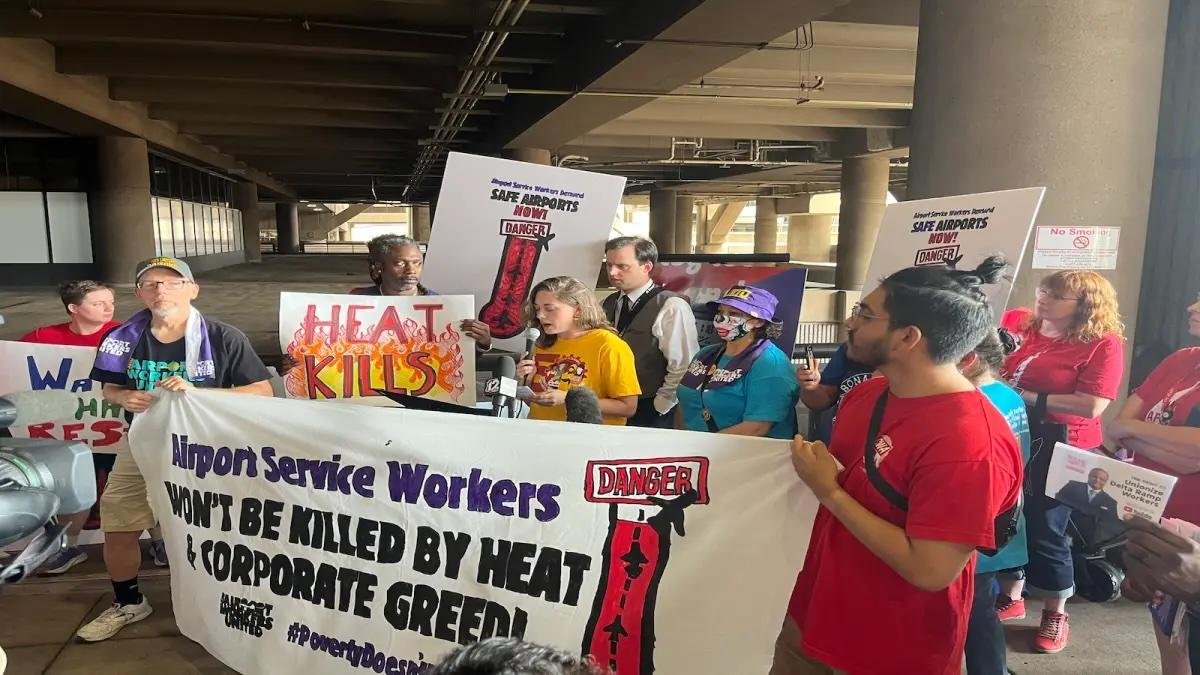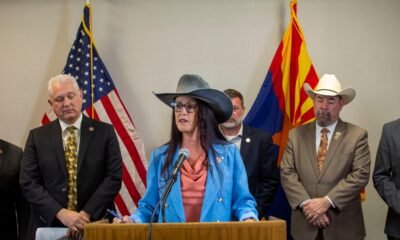Business
Workers Unite Nationwide Following Alarming Surge in Heat-Related Fatalities

Cecilia Ortiz, a passenger service agent at Phoenix Sky Harbor International Airport, has experienced extreme working conditions over the past summer. For two years, she has traversed 10 to 15 miles daily while managing heavy luggage and assisting passengers. With temperatures exceeding 110 degrees Fahrenheit on the airport’s jet bridges, Ortiz reports being denied breaks and water by her supervisors.
“I have heart failure myself, and it is especially dangerous for me to work in extreme temperatures,” Ortiz stated during a recent press briefing. She advocates for basic workplace safety measures, including accessible drinking water, designated rest areas, and training to recognize heat exhaustion.
Ortiz is not alone; service employees from various sectors, including fast food and retail, have joined her in calling for stronger heat protections. This week, rallies are being held in 13 cities nationwide, from Atlanta to Los Angeles, to urge employers and federal authorities to address safety concerns related to extreme heat.
On Tuesday, significant demonstrations took place at airports in Charlotte, North Carolina, and Phoenix. Workers demanded immediate action to improve safety conditions, specifically requesting proper break times and drinking water access during heat waves.
Despite a recent local heat ordinance in Phoenix that mandates some protections, workers and several lawmakers expressed dissatisfaction with its enforcement. City Councilwoman Betty Guardado emphasized the ongoing struggle for basic necessities like water and breaks. “Why is it after passing an ordinance we’re still asking for the basics?” she questioned.
As climate change intensifies, the threat posed by extreme heat in workplaces is escalating. The recent deaths of two workers—postal employee Wednesday “Wendy” Johnson in North Carolina and sanitation worker Ronald Silver II in Maryland—have intensified calls for improved safety measures. Organizers believe these tragedies could have been averted with better workplace protections.
April Verrett, president of the Service Employees International Union, criticized employers for neglecting worker safety, urging the Biden administration to implement a federal heat regulation. “Dying on the job is just simply out of the question,” she asserted, highlighting the urgent need for change.
Representative Greg Casar of Texas echoed these sentiments, developing a push for nationwide heat protections. He argued that as temperatures rise, coordinated federal action is necessary to ensure the safety of workers across the nation.
In July, the Occupational Safety and Health Administration (OSHA) proposed a rule requiring employers to provide safe rest areas and adequate drinking water for workers when temperatures near 80 degrees. However, the proposal remains unfinalized amid political challenges, including potential legal hurdles and differing state laws, such as those in Texas and Florida that restrict local heat protection measures.
Casar stressed that if the OSHA rule were enacted, it could counteract regressive laws like those recently introduced in Texas. “We could have these heat protections codified in federal law this month,” he stated, but lamented the current political climate that hampers progress.
Last week, Arizona Representative Ruben Gallego criticized the Biden administration for inadequate responses to extreme heat challenges. He proposed adding extreme heat to FEMA’s disaster list, suggesting that the response to heat-related incidents should be comparable to natural disasters.
Gallego’s comments highlight a growing awareness of extreme heat as a public health crisis. In California, Senator Alex Padilla has also advocated for the proposed OSHA rule. “Holding employers accountable to provide commonsense heat-stress protections has only become more critical,” he noted.
Individual stories of extreme heat’s toll are emerging, like that of Shae Parker, who experienced severe heat exhaustion while working in South Carolina. “I had to leave work on a gurney. It was unbearable,” she recounted.
Farmworker Lourdes Cardenas from Fresno, California, described working in multiple 110-degree days, suffering dizziness and dehydration due to inadequate access to water and shade. “I know that one job is not worth my life,” she said, emphasizing the need for basic worker rights.


















